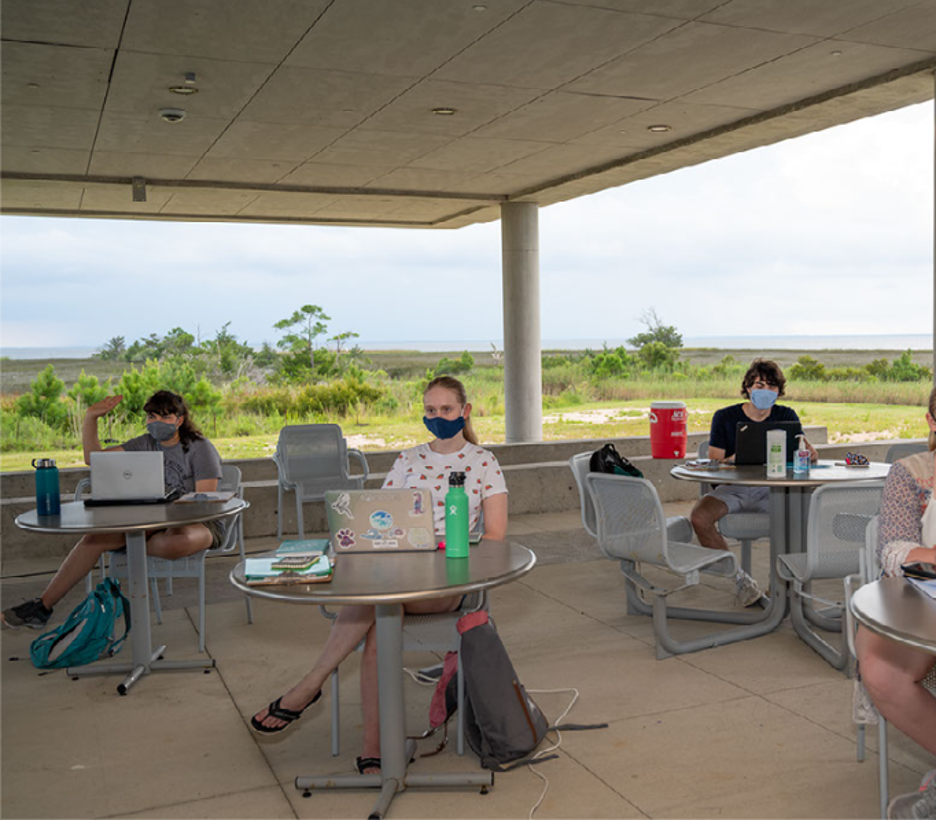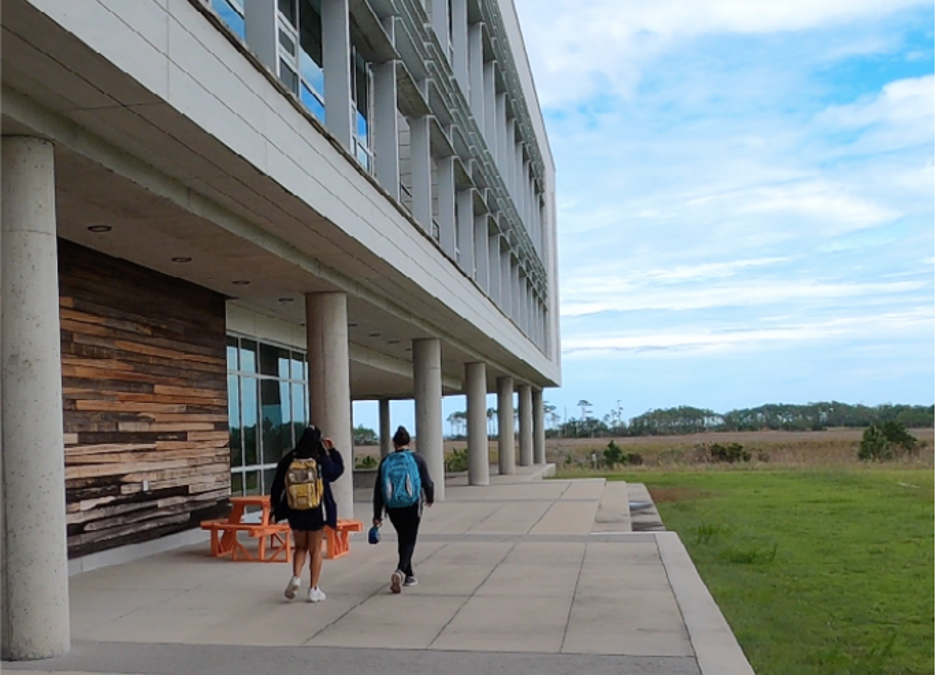Step on the ECU Outer Banks Campus most any weekday, and in addition to the hustle and bustle of boats being loaded up and research being conducted, you’ll also likely find a class in session or students wandering about. In the last few years, the Coastal Studies Institute (CSI) and ECU Integrated Coastal Programs (ICP) have stepped up their game on Roanoke Island. While there have been community programs for quite some time, the organizations are now starting to host more and more academic programs for students in pursuit of various degrees from UNC System schools.

At the beginning of each new school year, the Coastal Studies Institute hosts the UNC Institute for the Environment’s Outer Banks Field Site (OBXFS). OBXFS is a semester-long program for UNC-Chapel Hill undergraduates in which students take classes, go on field trips, participate in a local internship, and complete a group Capstone research project. The Capstone topic is always pertinent to issues threatening coastal North Carolina. Through the various experiences provided by OBXFS, the students are able to become completely immersed in interdisciplinary academics and the Outer Banks community, both of which provide a unique learning environment for participants.
“The OBXFS students learn about environmental topics from several different disciplinary perspectives, providing a real-world view of how disciplines are interconnected. They also apply their knowledge and newly learned approaches to the study of a complex natural resource problem through the Capstone research project and gain experience in research or an environmental job through internships with mentors in the CSI and Outer Banks communities. The semester program is meant to connect the dots between coursework and the complexity of real-world decision-making.”, explains Lindsay Dubbs, OBXFS Director.
Similarly, during the Spring semester, ECU and other UNC System undergraduate students have an opportunity to study at the beach through ECU’s Semester Experience at the Coast program that was recently initiated in 2020. While open to all students, the experience is especially designed for those with an interest in coastal studies, and the credits earned through the offered courses count toward the ECU Coastal and Marine Studies Interdisciplinary (COAS) Minor. In addition to classes, students often take on an internship with a local organization or an independent research project guided by a faculty member. Teamwork is often encouraged and required in many classrooms and labs, but great emphasis is also placed on individual development and preparation for further interdisciplinary learning and professions. The environment of the OBX Campus and the surrounding area make it the ideal place to foster continued interest in coastal issues through hands-on lab and field-based experiences.

“The Semester Experience at the Coast is a unique program that truly immerses students into the curricula that they have come to the Outer Banks campus to study. Students have an opportunity to actually visit and experience the habitats, people, communities and processes that are typically only presented within the pages of textbooks and readings”, says Reide Corbett, Dean of ECU Integrated Coastal Programs and Executive Director of the Coastal Studies Institute.
He continues, “We can provide the real-world analog in concert with more traditional classroom learning, and we are excited by the positive response from the students during the last two spring semesters. We are continuing to grow the spring program and intend to expand this interdisciplinary academic opportunity to include both the fall and spring semesters in the near future.”
While undergraduate students have their own designated semesters to be on campus, there are almost always graduate students around. The ECU Outer Banks Campus offers a unique, desirable setting for many participants of ECU’s Integrated Coastal Sciences Ph.D. (ICS) program. This research-intensive doctoral program blends natural and social sciences to best prepare students to work across disciplinary boundaries while addressing real coastal issues. The program exposes students to field work and places great emphasis on collaboration, while providing enough flexibility to allow students to choose where they would like to study (Greenville or OBX). Upon completion of their dissertation, students are well-prepared for careers with government agencies, private firms, nonprofit organizations or in academia.

“Wicked, complex problems at the coast take a team of researchers to solve. To be successful at solving these complex coastal problems, one needs to understand what kind of team to put together, what kinds of language to understand and speak, and what types of skills and datasets will need to be analyzed. Students get all of that training through our program. This coastal Ph.D. program trains the students to address complex problems from multiple perspectives and present them, from day one, to scientists and managers, then translating and communicating that science to a broad audience.”, says Sid Mitra, ICS Program Director.
Though each of the academic programs taking place on the ECU Outer Banks Campus differ, there is one very common, highly-emphasized aspect- they all have an interdisciplinary focus! Coastal studies, coastal issues, and coastal management are extremely complex and often have many overlapping facets. In order to produce the best results, it is imperative that our students are trained to tackle problems from multiple perspectives. By having interdisciplinary training, students will be well-prepared to work with various stakeholders and researchers from many different backgrounds and will be able to contribute great things to their own fields and communities as well as society as a whole. These students are the next great generation of upcoming coastal scientists, educators, policy-makers, and managers.



 Based at the Coastal Studies Institute (CSI), the North Carolina Renewable Ocean Energy Program (NCROEP) advances inter-disciplinary marine energy solutions across UNC System partner colleges of engineering at NC State University, UNC Charlotte, and NC A&T University. Click on the links below for more information.
Based at the Coastal Studies Institute (CSI), the North Carolina Renewable Ocean Energy Program (NCROEP) advances inter-disciplinary marine energy solutions across UNC System partner colleges of engineering at NC State University, UNC Charlotte, and NC A&T University. Click on the links below for more information. ECU's Integrated Coastal Programs (ECU ICP) is a leader in coastal and marine research, education, and engagement. ECU ICP includes the Coastal Studies Institute, ECU's Department of Coastal Studies, and ECU Diving and Water Safety.
ECU's Integrated Coastal Programs (ECU ICP) is a leader in coastal and marine research, education, and engagement. ECU ICP includes the Coastal Studies Institute, ECU's Department of Coastal Studies, and ECU Diving and Water Safety. The ECU Outer Banks campus is home to the Coastal Studies Institute.
The ECU Outer Banks campus is home to the Coastal Studies Institute.

